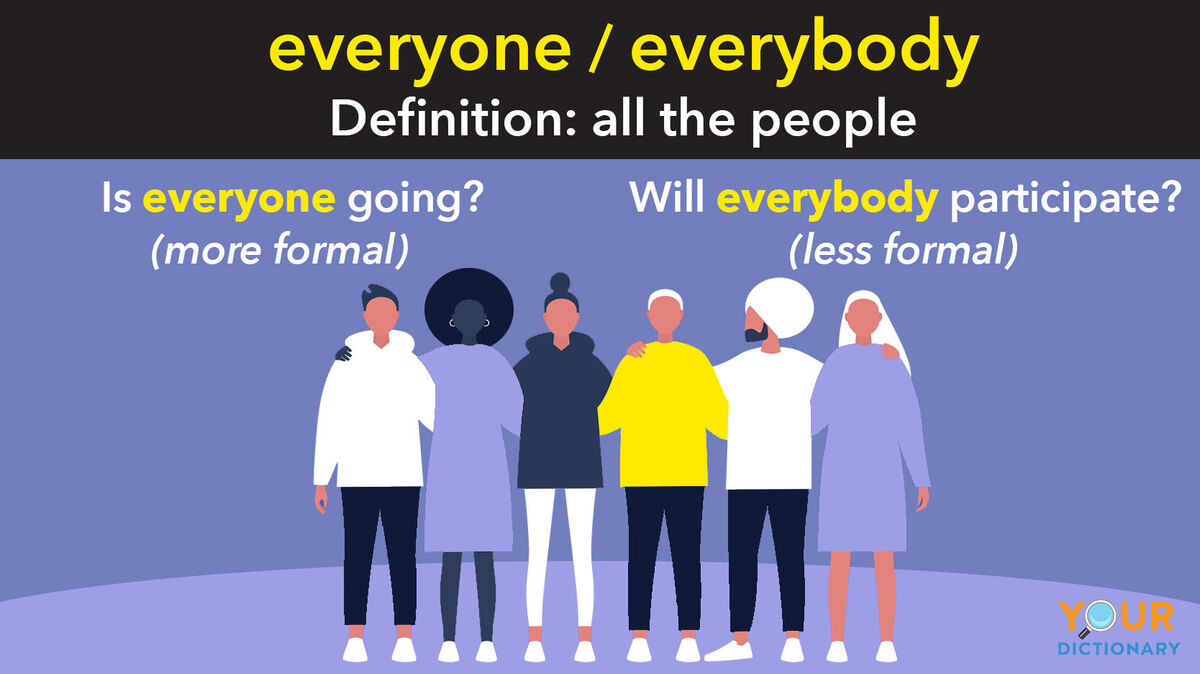
Are you wondering how the words everyone and everybody differ from one another? These words are actually synonyms for each other, so they mean the same thing and can be used interchangeably. The only difference between everyone vs. everybody is that one word is considered a bit more formal than the other.
Making Sense of Everyone vs. Everybody
Aside from the obvious spelling difference, the words everyone and everybody are very similar. They do differ in terms of formality, but that's the only real difference.
- definition - Everyone and everybody both mean every person or all the people.
- part of speech - Both words are singular indefinite pronouns.
- formality - Everyone is a more formal word choice than everybody.
Because these words are so similar, in most circumstances it doesn't matter which word you choose when referring to "every person." If you're writing a document or preparing a presentation that requires formal diction, it's probably best to use everyone rather than everybody, just because the word is a bit more formal. However, either word is perfectly fine to use in all but the most formal conversations and documents.
Example Sentences With Everyone and Everybody
Review a few sample sentences featuring everyone and everybody to get a better understanding of how these words tend to be used in conversations and writing. Note that these words are singular indefinite pronouns. This means that you should pair them with singular verbs in sentences.
- I don't think everyone is happy with the new policy.
- Everybody will need to submit an idea for the science fair.
- Everyone seems interested in reading Lord of the Flies.
- Will everybody from our class participate in field day?
- Is everyone going to grandma's house for Easter this year?
- We need everybody to donate at least $5 to the fundraiser.
- Has everyone turned in the assignment?
- Everybody seems to be looking forward to the trip.
Because everyone and everybody can be used interchangeably, it would be correct to use either word in any of the above sample sentences.
All vs. Everyone and Everybody
The word all can be a synonym for everyone and everybody, but that's not the only way the word all can be used. All doesn't have to refer to people; it can also be used to refer to objects. That is not the case with everyone and everybody; those words always refer to people. When the word all refers to the totality of people, that's when it means the same thing as everyone as everybody. For example, the three sentences below all mean the same thing.
- All the people I met at the conference were really nice.
- Everyone I met at the conference was really nice.
- Everybody I met at the conference was really nice.
Note that all is plural, while everyone and everybody are singular. That's why the verbs in the same sentences above are not the same. They are adjusted for subject-verb agreement.
Every One vs. Everyone
There is a subtle difference between every one (written as two words) and everyone (written as one word). Both of these options still refer to every person, but the two-word option places special emphasis on each individual person within that group.
- Everyone is excited to go. This refers to the collective excitement of the group, without any emphasis on individual members.
- Every one of us is excited to go. This suggests that each member of the group is individually excited.
A good guideline to follow when choosing between everyone and every one is to consider if your meaning would be most accurately conveyed if you inserted the word "single" between "every" and "one." When that is the case, you should opt for the two-word phrase (every one) rather than the compound word (everyone),
Every Body vs. Everybody
Every body (expressed as two words) does not mean the same thing as the indefinite pronoun everybody. When you're trying to say "every person" or "all the people," you should never use every body. That combination of words means something entirely different; it is literally referring to the physical body.
- The phrase "everybody in the morgue" would refer to all of the living humans who are physically inside the space of a hospital or other building used as a morgue.
- The phrase "every body in the morgue" refers to all of the dead bodies (corpses) stored in the morgue and could refer to the live bodies in addition.
- "A trait of mammals is that every body is covered in hair" would mean that the bodies of all animals classified as mammals are hair-covered.
- "Everybody is covered in hair" would mean that all of the people the speaker or writer is referring to are covered in hair. Since people are mammals, this would be a true statement, but it doesn't mean the same thing as the sentence above it.
If you're not referring to physical bodies, don't use "every body." Stick with the indefinite pronoun everybody, or opt for everyone, or even every one (depending on your intended meaning).
Mastering Pronoun Usage
Learning the difference between everyone vs. everybody is an important step toward mastering proper pronoun usage. Once you've learned how to use these indefinite pronouns, you'll be ready to learn even more about pronouns. Next, make sure you're aware of the different types of pronouns. Then, focus your attention on pronoun agreement. From there, explore more commonly confused words such as anyone vs. anybody. Pretty soon, you'll be penning prose that uses pronouns like a professional writer!